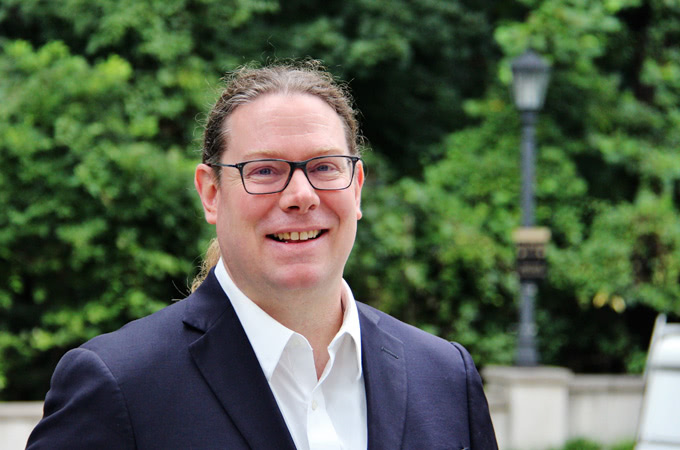Allen Brizee, Ph.D., supports Loyola's Ignatian mission by engaging students in the local community
Students become critical thinkers and active citizens through service-learning and engaged scholarship

Allen Brizee, Ph.D., associate professor of writing, joined Loyola in 2010 and was recently appointed faculty director for community-engaged learning and scholarship. In this role, he supports faculty members in incorporating service-learning into their courses and assists students and faculty with conducting community-based research.
Brizee has also served on the University’s Commitment to Justice committee and has worked with local neighborhoods and nonprofit organizations on service-learning projects with his writing students. He holds a Ph.D. in English from Purdue University, where he specialized in rhetoric and composition, technical writing, and public rhetorics, and earned both a Bachelor and Master of Arts in English from Virginia Tech.
Brizee recently spoke with Loyola magazine about how he sees his role helping Loyola students become critical thinkers and active citizens through service-learning and engaged scholarship.
What does your role as faculty director for community-engaged learning and scholarship entail?
As faculty director for community-engaged learning and scholarship, I help increase awareness of and participation in service-learning and service component courses, as well as increasing community-based research. I will also be working on faculty development and training for civic engagement. These responsibilities will, of course, grow my relationships with community members and community organizations. I will be attending local neighborhood association meetings to learn more about how Govans residents might collaborate with Loyola to bring about positive change in Baltimore.
In your opinion, what is the value and impact of community-engaged teaching and scholarship at a university?
The ancients recognized the value of teaching their students to become critical and engaged members of their societies: Isocrates, Aristotle, Cicero, and Quintilian all taught their students to be critical thinkers and active citizens in Greece and Rome. Similarly, St. Ignatius and his fellow Jesuits engaged with the world to educate people and address the most difficult issues of their time.
Likewise, students at modern universities must be prepared to be thoughtful participants in our society. Learning through doing is an essential part of this process. Faculty members may also use a community-focused approach when appropriate to apply their research in practical ways and to co-develop knowledge with the community. We can play to our strengths and highlight our community collaboration. Then students looking for a different type of education—an education that truly forms people for and with others—will recognize that Loyola is the place to be right now.
Current research shows that service-learning and engaged scholarship are high-impact practices, and we have empirical evidence that shows the ancients were right all along! It’s sort of the next generation of this type of work. The civic engagement and the community-based research are woven into completing service.
What excites you most about your new role as director of community-engaged teaching and scholarship?
I enjoy working with the outstanding team in Loyola’s Center for Community Service and Justice (CCSJ). I particularly like collaborating with students, faculty members, and community members on projects that will foster social justice. For example, we’re rolling out three projects that will support community-engaged teaching and scholarship right now. The first one is increasing the number and types of community workshops we’ve been running. In 2014 and 2017, I ran literacy and employment workshops with GEDCO/CARES, and last year JP Krahel, Ph.D., associate professor of accounting, ran tax preparation workshops at the Loyola Clinical Centers. Both of these types of workshops had very positive results, so we’re planning more. We will be offering grant money to faculty members and students who want to develop their own community workshops.
How do you see your role supporting Loyola’s Jesuit mission?
Service-learning and engaged scholarship directly support the Jesuit mission because they help students learn course subject matter, help faculty members collaborate with their students and with the community, and they help community members build relationships with one another to address issues facing their neighborhoods. Societal problems by their very nature are whole-person problems; they are interdisciplinary, and so we must work in an interdisciplinary way to address them.
Community-engaged learning and scholarship also require an academic rigor and personal responsibility that can help students learn more about project management. In turn, this helps students transition to the workplace and to graduate school. Most importantly, though, community-engaged learning and scholarship can lead to the personal transformation of students, faculty members, and community members.
What is your favorite thing about working at Loyola?
I have three favorite things about Loyola: the social justice mission, the close-knit family relationships, and the location in Baltimore. I’ve worked at many other types of institutions, and Loyola is the only place I’ve felt such a strong passion for bringing about positive change in the community. Similarly, the close-knit relationships at Loyola are very special and make the sometimes-difficult work of academia easier to overcome. Lastly, I love that Loyola is located in Baltimore. I grew up just outside of Washington, D.C., and I always enjoyed coming to Baltimore. I love the Orioles, the seafood, and the neighborhoods. But most of all, I love the spirit of Baltimore. Despite our troubled history and the challenges we face today, this city stands strong.
What is something students might be surprised to learn about you?
I’m not sure if this will be a surprise or not, but I’m an avid gamer—not so much with video games but with table-top and role-playing games. Gaming brings people together to laugh and have fun, and it can also be a wonderful way to learn new things, about yourself, about other people, and about life.